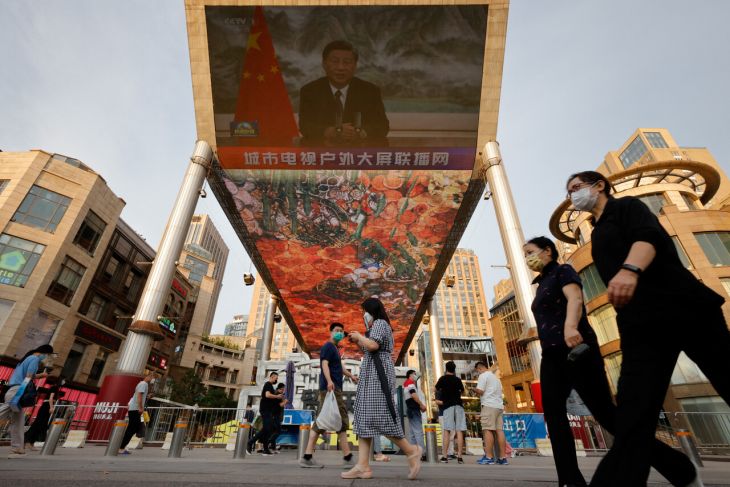Thirty-two years ago, when the Cold War ended, Russia made moves to become a quasi-democracy and many expected China to eventually transform itself into a capitalist economy with additional political reforms. This, especially, after the violent military suppression of pro-democracy demonstrators at Tiananmen square in 1989.
Since the 1980’s China’s economy has transformed through the economic reforms initiated by Deng Xiaoping, and China has become the world’s manufacturing hub. Following in the earlier footsteps of Japan and South Korea, China developed an unparalleled capacity to produce high quality consumer goods and it remains a key player in today’s global economy.
Former Party Chairman Hu Jintao was perceived to be a reformer, and many thought that Deng’s great leap forward in economics and industry would be matched by a great leap forward in the socio-political sphere. Hu’s embarrassing departure from the 20th Congress of the Communist Party on October 22nd and current Secretary-General Xi Jinping’s hardline speech earlier that weekend provided the global audience with a stark view of a consolidated political transition by conservative elements and a sidelining of those who would reform the system.
What does this mean?
China is facing several serious challenges that hard liners may not be able to manage effectively. Fifty percent of the population is under the age of 55, and they never lived in a system of ideological purity and real communist government.
On the contrary, they are well educated and becoming richer by the day – leading me to question whether the hardliners can contain them in an ideological straitjacket much longer. The Chinese revolution and subsequent system were designed to transform a rural agrarian economy into a more sophisticated industrial economy. Reverting to an antiquated political system simply cannot work if China is to remain a global power. As my brother always says, you can’t put the toothpaste back in the tube.
The Chinese economy is slowing down as demand for products in their export markets level off as the global economy enters a post-Covid-19 recession.
Consumers of Chinese products have their flat-screen televisions and smart phones and are otherwise preoccupied with paying off their mortgages and covering significant increases in the price of gas and food. A major Canadian importer told me this weekend that the cost of a shipping container from Shanghai to Los Angeles has dropped from a Covid-19 high of $28,000 to $2000 – underscoring diminishing consumer demand. As well, many in the West prefer the experience of travel after two years of lockdowns to the acquisition of things.
China’s renewed aggressive postures with respect to Taiwan and to its immediate neighborhood has all the trappings of trying to arouse public indignation to rally around the flag while the Party silently consolidates a new and deeper hold on society. In addition, their support of Russia’s Ukraine invasion has alarmed its western customers but at the same time, Russia’s problems in Ukraine should serve as a bucket of cold water on expansionist moves, especially against a well-armed and well-trained Taiwanese military and the opposition of major world powers to any attempt to force a union between both entities.
Its Belt and Road initiative has been very popular in many markets around the world. But it also faces several challenges. Some countries are becoming wary of Chinese designs on their national infrastructures as the Chinese take ownership of facilities for which recipient governments cannot pay. In addition, as China’s economy slows and as demand for more government services grows domestically, can China afford to invest trillions of dollars externally at the expense of its own market?
What appears certain to me is that post Covid and the Ukraine Invasion, globalization has reached its end for now. It will likely be replaced by more regional trading groups and a renewal of nationalist feelings around the world. Xi’s speech is a manifestation of this phenomenon, and it will likely prevail for some time. Protectionism will allow countries to focus their economic policies on developing their key products (protective gear, vaccines, and others as we witnessed with the Covid-19 pandemic) nationally or among like-minded states, and not center the production of strategic products in states that can behave capriciously when it suits them.
This is the major lesson I am taking away from the renewed Chinese stand; I look forward to hearing opposing views.
Keep reading: A Foreign Policy U-Turn?
Edition: Estefanía Cardeña
Proyectos realizados en el país tendrán incentivo fiscal de 30 % del ISR
La Jornada Maya
El célebre “Jefe Ratonero del Gabinete” ha servido a seis primeros ministros y se mantiene como figura entrañable del poder británico
Ap
El plan urbano propone una visión participativa y sostenible, abierta a ajustes mediante consulta ciudadana
Rosario Ruiz Canduriz
Comparsas, batucadas y carros alegóricos animaron el arranque; saldo blanco y amplia participación ciudadana
La Jornada Maya
